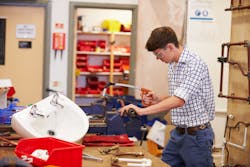Shops which cater, exclusively, to the service facet of the trade face issues which are different from those companies whose work involves new or remodel commercial, industrial and residential projects. In a perfect world, all journeymen would have the depth and breadth of skill and trade knowledge to be able to seamlessly shift from one type of work to another. Journeymen would then gravitate to the type of work which best suits their personal proclivities. The reality today is not the case.
In years past, most apprentices were given a broad trade education. In addition to the requisite physical skills needed to become a proficient mechanic, they were also schooled in practical theory and application in all aspects of their chosen craft.
Since today’s terminology for the time-honored title of journeyman or mechanic is technician, or tech, we’ll use that term for this discussion. There is no doubt that we have a dearth of qualified, or even available, trainees coming into our trade. With that being the case, trade education has undergone a sea of change as to how we fill the manpower void.
Today, it is more than likely that a service tech is brought into the service and repair milieu without a thorough grounding in the overall trade craft. Teaching most service and repair skills does not, necessarily, require that the apprentice have a working knowledge of how all the plumbing and/or mechanical systems work and relate to each other. The theory and application of same has also gone by the wayside at this level of trade craft. Hydraulics, roof drainage, sanitary drainage, waste and vent piping, gas delivery system, design and installation/repair are not really necessary to be an effective residential or light commercial service and repair tech.
The emphasis today is more on style rather than substance. The service tech of the first part of the 21st Century is more apt to be schooled in customer relations, salesmanship, computer skills and communication technology than he (or she) is in the whole trade, as in years past. This is not a knock. It is merely an observation of the current state of affairs in our industry. Just as journeymen and apprentices who work in the new and remodel areas of the trade are, usually, not really strong in the service and repair aspects, so too the service techs are lacking in an overall trade education and system installations.
Before you start sending me nasty-grams, I am making broad generalities here. Also, the observations are my own, based on talking to acquaintances and owners of various shops. As the trade has become more compartmentalized, it seems that it has also become specialized. It’s a great thing to encourage and mold your service people into copies of the iconic George Brazil advertising model; a handsome, lithe, swarthy, white-suited plumber with a dazzling smile and a tool box coming to your home. Unfortunately, in my view, the trade at large is suffering.
As mentioned above, it is no longer an absolute requirement that apprentices learn all phases and nuances of their trade before becoming journeymen. Knowing, for example, how to replace or repair domestic fixtures, or trouble-shoot a water heater (gas or electric), boiler or other plumbing appliances is sufficient. Knowing how the various systems these fixtures attach to function is not necessary to affect most repairs. Likewise, full understanding of sanitary sewerage and venting is not required to unstop a main line, water closet or sink. Granted, this knowledge is helpful to the novice tech, but it is not absolutely required.
So, the industry has responded to the lack of interested and/or qualified entry level employees by focusing on specific niches and needs rather than the global training of new craftsmen. The market always finds a way to exploit a lack or need and to develop an answer to a specific problem. The basic trade hasn’t changed, but the marketplace certainly has.
To work within this new reality, we need to emphasize the traditional whole trade education. Taking to heart the needs of the marketplace, service techs need to be taught the trade in less traditional fashion, but they definitely need to be taught it. Training programs can be (and are in some instances) required to fill the gaps in trade craft that arise from the current method of training job specific employees. As much as sales training, computer communications and such are necessary to make a good service tech, so too classes in trade craft and theory also need to be added.
This is a nationwide, if not global, trend and needs to be addressed nationally in order to be effective. I am not in favor of adding more government bureaucracy to our already over-controlled industry, so this idea needs to be implemented within the trade, through associations, national and local trade groups.
The Brooklyn, N.Y.-born author is a retired third generation master plumber. He founded Sunflower Plumbing & Heating in Shirley, N.Y., in 1975 and A Professional Commercial Plumbing Inc. in Phoenix in 1980. He holds residential, commercial, industrial and solar plumbing licenses and is certified in welding, clean rooms, polypropylene gas fusion and medical gas piping. He can be reached at [email protected].
About the Author
Al Schwartz
Founder
The Brooklyn, N.Y.-born author is a retired third generation master plumber. He founded Sunflower Plumbing & Heating in Shirley, N.Y., in 1975 and A Professional Commercial Plumbing Inc. in Phoenix in 1980. He holds residential, commercial, industrial and solar plumbing licenses and is certified in welding, clean rooms, polypropylene gas fusion and medical gas piping. He can be reached at [email protected].
